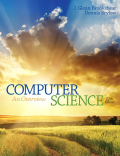
EBK COMPUTER SCIENCE: AN OVERVIEW
12th Edition
ISBN: 8220102744196
Author: BRYLOW
Publisher: PEARSON
expand_more
expand_more
format_list_bulleted
Expert Solution & Answer
Chapter 7, Problem 1SI
a.
Explanation of Solution
What should Marry do?
- Marry must not avoid the flaws. She can easily find out at which point system is defected with the help of some methodologies.
- These methodologies are called software testing. If Mary does not get correct output, then she can test the system by black box testing. The results of any system are tested in black box testing...
b.
Explanation of Solution
What should Mary do and to what extent she is liable to for the breach of the security?
- A software license grants the user certain permissions to use the product without transferring ownership rights to the intellectual property.
- Hence, Marry should get the patent for her software and get the copyright license...
c.
Explanation of Solution
Were Mary Analyst’s actions correct?
“Yes”, Mary Analyst’s actions were correct.
- Because if the system has flaws sooner or later it will show up and the system will fail. That will also do big damage to the system as well as financial hardship and some employees may lose their jobs...
Expert Solution & Answer
Want to see the full answer?
Check out a sample textbook solution
Students have asked these similar questions
Find the voltage V0 across the 4K resistor using the mesh method or nodal analysis. Note: I have already simulated it and the value it should give is -1.714V
Resolver por superposicion
Describe three (3) Multiplexing techniques common for fiber optic links
Chapter 7 Solutions
EBK COMPUTER SCIENCE: AN OVERVIEW
Ch. 7.1 - Prob. 1QECh. 7.1 - Prob. 2QECh. 7.1 - Prob. 3QECh. 7.1 - Identify two contexts in which the field of...Ch. 7.2 - Prob. 1QECh. 7.2 - Prob. 2QECh. 7.2 - What is the role of a software requirements...Ch. 7.3 - Prob. 1QECh. 7.3 - Prob. 2QECh. 7.3 - Prob. 3QE
Ch. 7.3 - What potential problems do you suspect could arise...Ch. 7.4 - Prob. 1QECh. 7.4 - Prob. 2QECh. 7.4 - Prob. 3QECh. 7.4 - Prob. 4QECh. 7.4 - Prob. 5QECh. 7.4 - What is the difference between a traditional...Ch. 7.4 - Prob. 8QECh. 7.5 - Prob. 1QECh. 7.5 - Prob. 2QECh. 7.5 - Prob. 3QECh. 7.5 - Prob. 4QECh. 7.5 - Prob. 6QECh. 7.6 - Prob. 1QECh. 7.6 - Prob. 2QECh. 7.6 - Prob. 3QECh. 7.6 - Prob. 4QECh. 7.6 - Prob. 5QECh. 7.6 - Prob. 6QECh. 7.7 - Prob. 1QECh. 7.7 - Prob. 2QECh. 7.7 - Prob. 3QECh. 7.8 - Prob. 1QECh. 7.8 - Prob. 2QECh. 7.8 - Prob. 3QECh. 7.8 - Prob. 4QECh. 7.9 - Prob. 1QECh. 7.9 - Prob. 2QECh. 7.9 - Prob. 3QECh. 7 - Give an example of how efforts in the development...Ch. 7 - Prob. 2CRPCh. 7 - Explain how the lack of metrics for measuring...Ch. 7 - Would you expect that a metric for measuring the...Ch. 7 - Prob. 5CRPCh. 7 - Prob. 6CRPCh. 7 - Prob. 7CRPCh. 7 - Prob. 8CRPCh. 7 - Prob. 9CRPCh. 7 - Prob. 10CRPCh. 7 - Prob. 11CRPCh. 7 - Prob. 13CRPCh. 7 - Prob. 14CRPCh. 7 - Prob. 15CRPCh. 7 - Prob. 16CRPCh. 7 - Prob. 17CRPCh. 7 - Prob. 18CRPCh. 7 - Prob. 20CRPCh. 7 - Prob. 21CRPCh. 7 - Prob. 22CRPCh. 7 - Prob. 23CRPCh. 7 - Prob. 24CRPCh. 7 - Contrast the information represented in a class...Ch. 7 - What is the difference between a one-to-many...Ch. 7 - Prob. 27CRPCh. 7 - Prob. 28CRPCh. 7 - Prob. 29CRPCh. 7 - Prob. 30CRPCh. 7 - Prob. 31CRPCh. 7 - Prob. 32CRPCh. 7 - Prob. 33CRPCh. 7 - Prob. 34CRPCh. 7 - Extend your solution to the previous problem to...Ch. 7 - Prob. 38CRPCh. 7 - Prob. 39CRPCh. 7 - Identify some design patterns in fields other than...Ch. 7 - Prob. 41CRPCh. 7 - Prob. 42CRPCh. 7 - Prob. 43CRPCh. 7 - Prob. 44CRPCh. 7 - Prob. 45CRPCh. 7 - Prob. 46CRPCh. 7 - How does open-source development differ from beta...Ch. 7 - Prob. 48CRPCh. 7 - Prob. 49CRPCh. 7 - Prob. 50CRPCh. 7 - Prob. 51CRPCh. 7 - Prob. 52CRPCh. 7 - In what ways can a software developer be...Ch. 7 - Prob. 1SICh. 7 - Prob. 2SICh. 7 - Prob. 3SICh. 7 - Prob. 4SICh. 7 - Prob. 5SICh. 7 - What happens if technology begins to advance so...Ch. 7 - Is the computer revolution contributing to, or...Ch. 7 - Prob. 8SICh. 7 - If you had a time machine, in which period of...Ch. 7 - Prob. 10SI
Knowledge Booster
Similar questions
- Could you help me to know features of the following concepts: - commercial CA - memory integrity - WMI filterarrow_forwardBriefly describe the issues involved in using ATM technology in Local Area Networksarrow_forwardFor this question you will perform two levels of quicksort on an array containing these numbers: 59 41 61 73 43 57 50 13 96 88 42 77 27 95 32 89 In the first blank, enter the array contents after the top level partition. In the second blank, enter the array contents after one more partition of the left-hand subarray resulting from the first partition. In the third blank, enter the array contents after one more partition of the right-hand subarray resulting from the first partition. Print the numbers with a single space between them. Use the algorithm we covered in class, in which the first element of the subarray is the partition value. Question 1 options: Blank # 1 Blank # 2 Blank # 3arrow_forward
- 1. Transform the E-R diagram into a set of relations. Country_of Agent ID Agent H Holds Is_Reponsible_for Consignment Number $ Value May Contain Consignment Transports Container Destination Ф R Goes Off Container Number Size Vessel Voyage Registry Vessel ID Voyage_ID Tonnagearrow_forwardI want to solve 13.2 using matlab please helparrow_forwarda) Show a possible trace of the OSPF algorithm for computing the routing table in Router 2 forthis network.b) Show the messages used by RIP to compute routing tables.arrow_forward
- using r language to answer question 4 Question 4: Obtain a 95% standard normal bootstrap confidence interval, a 95% basic bootstrap confidence interval, and a percentile confidence interval for the ρb12 in Question 3.arrow_forwardusing r language to answer question 4. Question 4: Obtain a 95% standard normal bootstrap confidence interval, a 95% basic bootstrap confidence interval, and a percentile confidence interval for the ρb12 in Question 3.arrow_forwardusing r languagearrow_forward
- using r languagearrow_forwardusing r language Obtain a bootstrap t confidence interval estimate for the correlation statistic in Example 8.2 (law data in bootstrap).arrow_forwardusing r language Compute a jackknife estimate of the bias and the standard error of the correlation statistic in Example 8.2.arrow_forward
arrow_back_ios
SEE MORE QUESTIONS
arrow_forward_ios
Recommended textbooks for you
 Principles of Information Systems (MindTap Course...Computer ScienceISBN:9781285867168Author:Ralph Stair, George ReynoldsPublisher:Cengage Learning
Principles of Information Systems (MindTap Course...Computer ScienceISBN:9781285867168Author:Ralph Stair, George ReynoldsPublisher:Cengage Learning Fundamentals of Information SystemsComputer ScienceISBN:9781305082168Author:Ralph Stair, George ReynoldsPublisher:Cengage Learning
Fundamentals of Information SystemsComputer ScienceISBN:9781305082168Author:Ralph Stair, George ReynoldsPublisher:Cengage Learning Systems ArchitectureComputer ScienceISBN:9781305080195Author:Stephen D. BurdPublisher:Cengage Learning
Systems ArchitectureComputer ScienceISBN:9781305080195Author:Stephen D. BurdPublisher:Cengage Learning Fundamentals of Information SystemsComputer ScienceISBN:9781337097536Author:Ralph Stair, George ReynoldsPublisher:Cengage Learning
Fundamentals of Information SystemsComputer ScienceISBN:9781337097536Author:Ralph Stair, George ReynoldsPublisher:Cengage Learning A+ Guide To It Technical SupportComputer ScienceISBN:9780357108291Author:ANDREWS, Jean.Publisher:Cengage,
A+ Guide To It Technical SupportComputer ScienceISBN:9780357108291Author:ANDREWS, Jean.Publisher:Cengage,

Principles of Information Systems (MindTap Course...
Computer Science
ISBN:9781285867168
Author:Ralph Stair, George Reynolds
Publisher:Cengage Learning

Fundamentals of Information Systems
Computer Science
ISBN:9781305082168
Author:Ralph Stair, George Reynolds
Publisher:Cengage Learning

Systems Architecture
Computer Science
ISBN:9781305080195
Author:Stephen D. Burd
Publisher:Cengage Learning


Fundamentals of Information Systems
Computer Science
ISBN:9781337097536
Author:Ralph Stair, George Reynolds
Publisher:Cengage Learning

A+ Guide To It Technical Support
Computer Science
ISBN:9780357108291
Author:ANDREWS, Jean.
Publisher:Cengage,